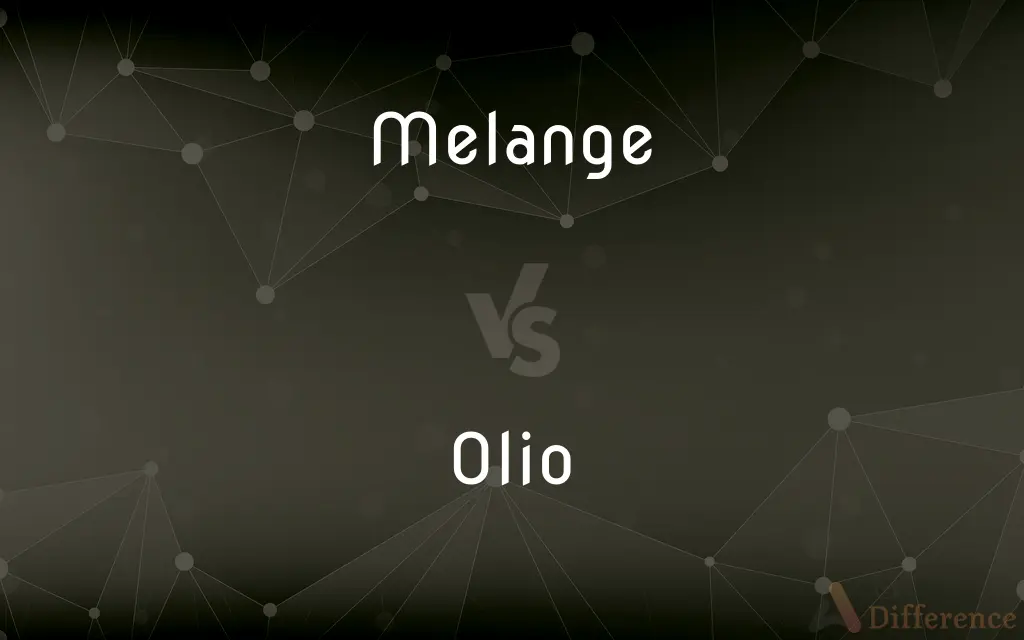Melange vs. Olio — What's the Difference?
By Fiza Rafique & Urooj Arif — Updated on April 16, 2024
Melange refers to a mixture or blend of often heterogeneous elements, emphasizing a unified whole, whereas olio combines diverse ingredients or elements, often without a coherent theme.

Difference Between Melange and Olio
Table of Contents
ADVERTISEMENT
Key Differences
Melange typically suggests a blend that is somewhat harmonious or aesthetically pleasing, used especially in contexts like fashion or cuisine where the blend results in a desirable outcome. On the other hand, olio refers to a more indiscriminate mixture, often used to describe collections or assemblies that lack intrinsic order or thematic consistency.
In literary terms, melange is often used to describe a narrative or a work that skillfully incorporates a variety of styles or influences. Whereas, olio is used to denote a work that contains a hodgepodge of pieces or excerpts, which may not necessarily complement each other.
Melange can imply a sophisticated integration of elements that enhance each other, enriching the overall texture or experience. In contrast, olio often conveys a less deliberate assembly, where the focus is on variety rather than synergy.
The use of melange in social or cultural discussions often carries a positive connotation, suggesting a rich, diverse blend that benefits from its components. On the other hand, olio can sometimes carry a slightly negative connotation, implying a somewhat chaotic or less curated collection.
In culinary contexts, melange is used to describe dishes that are thoughtfully prepared to blend flavors harmoniously. Meanwhile, olio can describe a dish that is made up of leftover ingredients, often resulting in an unpredictable flavor profile.
ADVERTISEMENT
Comparison Chart
Connotation
Often positive, implies harmony and enrichment
Can be negative, implies randomness, lack of unity
Usage in art
Blend of styles that complement each other
Collection of disparate pieces
Usage in cuisine
Dishes with blended, harmonious flavors
Dishes made from assorted, often leftover ingredients
Literary usage
Narrative style that integrates various influences
Work comprising various unconnected excerpts
Cultural implication
Suggests beneficial diversity
Implies a mix without inherent synergy
Compare with Definitions
Melange
A mixture of disparate components that are blended to create a harmonious whole.
The gallery displayed a melange of modern and classical art.
Olio
A mixture of heterogeneous elements, often without a unifying theme.
The museum's exhibition was an olio of artifacts from various epochs.
Melange
A culinary term for a dish that harmoniously combines multiple ingredients.
The chef's special salad was a melange of exotic fruits and nuts.
Olio
A stew or soup made from leftovers or various available ingredients.
For dinner, she prepared an olio from the week's leftovers.
Melange
A term used in social contexts to describe a beneficial mix of diverse cultural elements.
The festival was a vibrant melange of different cultural traditions.
Olio
A term sometimes used pejoratively to suggest a lack of coherence in a collection or assembly.
The committee's report was an olio of old and new ideas that didn’t quite mesh.
Melange
A fabric made from blended fibers or colors.
Her dress was made of a rich, textured melange.
Olio
A miscellany or collection of miscellaneous pieces of literature or music.
His book is an olio of short stories, poetry, and random musings.
Melange
A literary work combining various styles or genres.
His latest novel is a melange of horror, fantasy, and realist literature.
Olio
Used to describe a show or performance featuring a variety of acts.
The variety show was an entertaining olio of comedy, magic, and music.
Melange
A mixture
"[a] building crowned with a mélange of antennae and satellite dishes" (Howard Kaplan).
Olio
A heavily spiced stew of meat, vegetables, and chickpeas.
Melange
(Geology) A metamorphic rock formation created from sediments and rocks scraped off the top of a downward-moving tectonic plate in a subduction zone.
Olio
A mixture or medley; a hodgepodge.
Melange
A mixture of different things; a disordered mixture.
The room was a melange of comic books and posters.
Olio
A collection of various artistic or literary works or musical pieces; a miscellany.
Melange
A Viennese coffee speciality, half steamed milk and half coffee.
Olio
Vaudeville or musical entertainment presented between the acts of a burlesque or minstrel show.
Melange
(geology) A large-scale breccia formed in the accretionary wedge over a subductional environment.
Olio
A rich, thick, Spanish stew consisting of meat and vegetables.
Melange
A mixture; a medley.
Olio
(figuratively) A medley or mixture; a hotchpotch.
Melange
A motley assortment of things
Olio
(figuratively) A collection of various musical, theatrical or other artistic works; a miscellany.
Olio
Vaudeville or similar miscellaneous musical or theatrical entertainment skits presented between the main acts of burlesque or minstrel shows.
Olio
A dish of stewed meat of different kinds.
Besides a good olio, the dishes were trifling.
Olio
A mixture; a medley.
Olio
A collection of miscellaneous pieces.
Common Curiosities
How is olio typically used in cooking?
In cooking, olio often refers to a dish made from a mix of ingredients, typically leftovers, without a specific recipe.
What makes a melange culturally significant?
A melange is culturally significant as it often represents the beneficial blending of diverse elements, leading to mutual enrichment.
What is a melange in fashion?
A melange in fashion refers to a blend of different fabrics, colors, or styles that create a unique and aesthetically pleasing look.
Can melange be used to describe music?
Yes, melange can describe music that blends various genres or styles to create a harmonious sound.
Can olio be a term of creativity?
Yes, in some contexts, olio can represent a creative, albeit eclectic, approach to assembling diverse elements.
What is the ideal use of olio in literature?
Olio is ideal for describing collections that include a variety of pieces, such as anthologies or compilations.
Is olio always a negative term?
Not always; while olio can imply a lack of cohesion, it can also celebrate diversity and variety in some contexts.
Does olio have a specific origin?
Olio comes from Spanish, originally meaning 'a dish of many ingredients', highlighting its nature as a mix.
How can one create a successful melange in art?
A successful melange in art typically involves combining elements that enhance each other, creating a more profound overall impression.
How does melange differ from a mere mixture?
Melange often implies a thoughtful and beneficial blending, whereas a mixture might simply be a combination without these connotations.
What distinguishes a cultural melange from a cultural olio?
A cultural melange benefits from the synergy of its diverse elements, while a cultural olio may simply be an assortment without synergistic benefits.
Can melange be used negatively?
Typically, melange is used positively, though it can be negative if the blend results in a confusing or cluttered outcome.
What should be avoided when creating an olio in cuisine?
When creating an olio in cuisine, it's important to avoid combining flavors that clash significantly, to maintain palatability.
What is the best setting to use the term olio?
Olio is best used in settings where a variety of elements are presented, such as in eclectic art exhibits or multi-genre performances.
How can melange enhance social interactions?
Melange can enhance social interactions by blending diverse cultural or social elements in a way that promotes understanding and appreciation.
Share Your Discovery

Previous Comparison
Earthquake vs. Fissure
Next Comparison
Dread vs. AweAuthor Spotlight
Written by
Fiza RafiqueFiza Rafique is a skilled content writer at AskDifference.com, where she meticulously refines and enhances written pieces. Drawing from her vast editorial expertise, Fiza ensures clarity, accuracy, and precision in every article. Passionate about language, she continually seeks to elevate the quality of content for readers worldwide.
Co-written by
Urooj ArifUrooj is a skilled content writer at Ask Difference, known for her exceptional ability to simplify complex topics into engaging and informative content. With a passion for research and a flair for clear, concise writing, she consistently delivers articles that resonate with our diverse audience.
















































